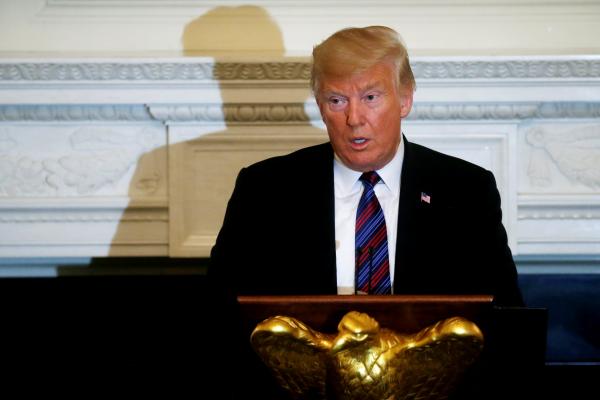What does it profit to gain the whole world but to lose your own soul? —Matthew 16:26.
Is there anything more applicable today than these familiar words of a poor Palestinian Jew who conquered sin, injustice, and death on our behalf? We should take note that our savior had a consistent habit of critiquing and challenging the hypocrisy and corruption that he saw displayed by the Pharisees and Sadducees, the religious leaders of his time.
On Monday night the president and first lady hosted a celebratory dinner for 100 evangelical leaders, including now famous religious figures like Paula White, Alveda King, Franklin Graham, Jerry Falwell Jr., Darrell Scott, Robert Jeffress, Ralph Reed, Tony Perkins, and Lester Warner. In his remarks, the president didn’t shy away from hyperbole or bombast, saying,
“We’re here this evening to celebrate America’s heritage of faith, family, and freedom. As you know, in recent years, the government tried to undermine religious freedom. But the attacks on communities of faith are over. … The support you’ve given me has been incredible. But I really don’t feel guilty because I have given you a lot back, just about everything I promised. And as one of our great pastors just said, ‘Actually, you’ve given us much more, sir, than you promised.’ And I think that’s true, in many respects.”
Even more alarming, in his private remarks to the group the president is on tape saying, “I just ask you to go out and make sure all you people vote. Because if they don’t we’re going to have a miserable two years and we’re going to have, frankly, a very hard period of time because then it just gets to be one election — you’re one election away from losing everything you’ve got.”
Jesus did not mince words for the religious leaders who were corrupted by power and guilty of grave hypocrisy. In Matthew 23 we see Jesus speaking with righteous indignation against the hypocrisy of the Pharisees, saying, “Woe to you, teachers of the law and Pharisees, you hypocrites! You give a tenth of your spices—mint, dill and cumin. But you have neglected the more important matters of the law— justice, mercy and faithfulness. You should have practiced the latter, without neglecting the former.” As people who humbly and prayerfully try to follow Christ’s words and example, there are moments when we are also called to name and critique religious hypocrisy, particularly when leaders misuse and abuse their moral authority to prop up and provide cover to immoral leadership.
Just two weeks before the evangelical dinner, President Trump hosted a meeting at the White House with a group of predominantly African-American urban pastors to discuss and laud the administration’s progress in advancing an “urban agenda.” Another group of prominent African-American pastors released a forceful critique of these attendees for their failure and unwillingness to challenge the president’s hateful rhetoric, let alone critique policies that have been detrimental to the welfare of urban communities. In a brilliant sermon delivered on the Sunday after this meeting, Pastor Howard-John Wesley described the moral danger and responsibility associated with accepting a seat at the political table.
The evangelical ‘state-like’ dinner took place just days after President Trump’s longtime lawyer Michael Cohen pleaded guilty to paying hush money on Trump’s behalf to a porn star and a Playboy model in order to cover up Trump’s alleged affairs, an act that violates campaign finance laws and arguably makes Trump guilty of obstruction of justice. In this same week, President Trump once again signaled his sympathy with white supremacists by making common cause with a white nationalist movement in South Africa. Despite these and other troubling events, including the unconscionable separation of children from their parents at the border, it is baffling and deeply exasperating that poll after poll demonstrates seemingly unwavering and unconditional support among white evangelicals behind the president. No amount of lying, cheating, and personal immorality seems to change this. While we may never know whether any of the president’s most trusted evangelical confidantes like Paula White ever use their access to influence or challenge the president’s callousness and narcissism, their unflinching public support lends him political cover that ultimately undermines their moral authority.
It seems that far too many evangelical leaders remain comfortable with the Faustian bargain they have made with this president, captured best by the remarks of Pastor Jeffress who before the meeting told CBN, “President Trump is the most pro-life, pro-religious liberty, and pro-conservative judiciary president in history, which is why evangelicals continue to support him enthusiastically.” This line of thinking begs the question of whether character or integrity even matter anymore to many evangelical leaders. For example, during the dinner President Trump publicly thanked James Dobson for his moral leadership, yet Dobson was one of the leading evangelical leaders calling for President Bill Clinton’s impeachment due his sexual indiscretions and lying.
While it may be easy to be cynical about people’s true motives, we should acknowledge the sincere but deeply misguided justification for some of their support because in their view he has delivered on the promise of nominating conservative federal and Supreme Court judges and protecting religious liberty. But as so many Christians of almost every persuasion have argued, being followers of Christ and applying all of the gospel to public leadership requires far more. We can’t afford to ignore all of the ways President Trump’s rhetoric, policy decisions, and leadership have contradicted gospel values and priorities and caused so much harm to many vulnerable people. And as many evangelical women leaders recently pointed out, there are many more effective ways to advance the pro-life cause than simply supporting the appointment of conservative judges. Further, Trump’s narcissism, cronyism, and disregard for the truth or the rule of law represents an existential threat to our democracy. As conservative columnist Mike Gerson argues, “The problem with Trumpism is not only the transparent excuses it offers (and requires others to accept) for shoddy and offensive behavior … the deeper issue is the distinctly non-Christian substance of President Trump’s values. His unapologetic materialism. His tribalism and hatred for ‘the other.’ His strength-worship and contempt for ‘losers,’ which smack more of Nietzsche than of Christ.”
Dr. Martin Luther King famously said that the church at its best “is not the master or the servant of the state, but rather the conscience of the state.” This precaution is desperately needed in our politics today, particularly in a moment in which President Trump has already given guidance to the IRS to ignore the Johnson Amendment, which prevents religious and nonprofit organizations from publicly endorsing political candidates.
I believe that the majority of pastors (even evangelical pastors) in this country are at some level deeply uncomfortable with the president’s rhetoric, leadership, and character but many are either afraid to speak out due to a fear of dividing and alienating their congregations or because they are hiding behind the conviction that their primary job is to focus on people’s soul salvation and not political matters. Yes, it will take moral courage and even some significant risk-taking to point out and challenge the hypocrisy and sycophancy we are seeing among many evangelical leaders. But the silence of far too many more moderate to conservative evangelical leaders only enables and reinforces the public’s perception that Trumpism and evangelicalism are one in the same. The growing public perception of evangelicals as an overly politicized, intolerant, and nationalistic movement represents a direct threat to the cause of evangelism or spreading the good news of Christ. Therefore resisting the amorality of Trumpism and challenging hypocrisy within the religious right has become an imperative for the witness, integrity, and reputation of the church. Nothing less than the soul of our nation is at stake.
Got something to say about what you're reading? We value your feedback!






